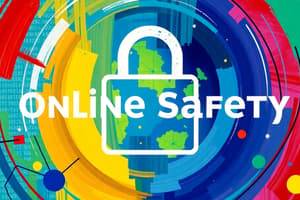Podcast
Questions and Answers
What does cultural relativism emphasize in understanding cultures?
What does cultural relativism emphasize in understanding cultures?
- Understanding cultures based on their own values and practices (correct)
- Comparing different cultures to derive a superior culture
- Evaluating cultures using one’s own standards
- The belief that all cultures are inherently superior
Which moral dilemma refers to conflicting moral requirements?
Which moral dilemma refers to conflicting moral requirements?
- Epistemic dilemma (correct)
- Ethical dilemma
- Cultural dilemma
- Structural dilemma
In the context of cross-cultural relationships, what is essential for understanding diverse lives?
In the context of cross-cultural relationships, what is essential for understanding diverse lives?
- Assuming all cultures have the same values
- Enforcing one culture's norms onto another
- Ignoring differences and focusing on similarities
- Acknowledging and respecting cultural differences (correct)
Which of the following best describes the concept of the structural dilemma?
Which of the following best describes the concept of the structural dilemma?
What does critical relativism primarily question?
What does critical relativism primarily question?
What does ethics primarily focus on?
What does ethics primarily focus on?
Which term describes special codes of behavior or courtesy?
Which term describes special codes of behavior or courtesy?
What distinguishes moral standards from non-moral standards?
What distinguishes moral standards from non-moral standards?
What is ethical relativism?
What is ethical relativism?
What defines a moral dilemma?
What defines a moral dilemma?
What is an organizational dilemma characterized by?
What is an organizational dilemma characterized by?
What typically involves moral standards?
What typically involves moral standards?
What is individual dilemma primarily associated with?
What is individual dilemma primarily associated with?
Flashcards are hidden until you start studying
Study Notes
Ethics and Etiquette
- Ethics comes from the Greek word ‘ethos’ and is grounded in standards of right and wrong.
- Ethics dictates what individuals ought to do concerning rights, obligations, societal benefits, and fairness.
- Etiquette encompasses accepted codes of behavior; for example, chewing with one's mouth open is considered poor etiquette.
Moral Standards
- Moral standards relate to human behavior, distinguishing between good and bad actions.
- They address serious wrongs or significant benefits impacting human beings.
- Non-moral standards represent rules unrelated to moral or ethical considerations.
Ethical Relativism and Cultural Understanding
- Ethical relativism posits that morality is shaped by cultural norms.
- Cultural relativism acknowledges global differences in customs, behavior, language, and traditions.
Dilemmas
- A dilemma is a situation requiring a difficult choice.
- Moral Dilemma: A temporary situation causing a conflict of morals where one moral must override another.
- Individual Dilemma: A personal moral conflict that challenges individual values or priorities, needing resolution by that individual.
- Organizational Dilemma: A complex workplace situation where employees and managers face conflicting moral imperatives, requiring a choice between competing values.
- Structural Dilemma: Involves institutional networks and theoretical frameworks leading to moral conflicts.
Culture
- Culture includes beliefs, values, behaviors, and material objects defining a community's way of life.
- Cross-Cultural Relationships: Relationships between individuals from different cultures that respect and acknowledge diverse lifestyles.
- Cultural relativism emphasizes understanding a culture from its internal perspective without imposing one’s own cultural judgments.
- Critical Relativism: Evaluates cultural practices by examining who accepts them and the reasons behind such acceptance.
Key Areas of Focus
- Familiarize with the 8 Types of Moral Dilemmas.
- Understand the 5 Characteristics of Culture.
- Explore the Stages of Moral Development according to Piaget.
- Epistemic Dilemma: Situations where two or more conflicting moral requirements exist.
Studying That Suits You
Use AI to generate personalized quizzes and flashcards to suit your learning preferences.




